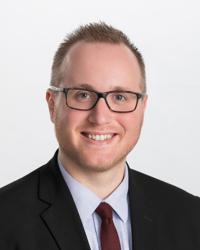
John Lace, PhD
- Neuropsychology
UnityPoint Provider
-
Hospital Affiliations:
- St. Luke's Hospital
- Gender: Male
-
Languages Spoken:
- English
About John Lace, PhD
Biography
Why did you become a provider: Born and raised outside Chicago (Go Cubs!), I come from a health care-focused family – my father is a physician, my mother is an occupational therapist and my sister is a nurse. We had a motto - "Do good things well." Growing up seeing my parents' passion for high-quality work and service to others, I am thrilled to have found my home in clinical neuropsychology wherein I can merge my clinical interests, passion for health care and lifelong goals in a spirit of excellence.
Why did you decide to join UPH? I am blessed to join the UnityPoint family. I am excited to call eastern Iowa home and continue promoting health and excellence within the community.
Medical Specialties or Special Interests: Many of my patients are referred for cognitive changes or memory concerns. I also have specialized interests in concussion/traumatic brain injuries, multiple sclerosis and movement disorders.
Describe your typical patient: Neuropsychology appointments are different from regular doctor visits. Patients typically spend a couple of hours in clinic, and appointments are usually divided into two parts. One part is a clinical interview, wherein I want to understand the patient, their background and history, and especially the cognitive concerns they and/or their family are noticing.
The second part includes a series of standardized cognitive tests designed to measure how the patient's brain is functioning compared to other people like them. The tests focus on things like attention/concentration, processing speed, language and learning/memory - a lot of patients say it feels like a day back in school. After the appointment, I prepare a comprehensive and readable report that goes through our conversation and the testing, clinical impressions/diagnoses (if warranted), and most importantly recommendations for continued care. I want to integrate the "what’s going on” and the "what comes next" related to your cognitive symptoms. All of the patient's doctors receive a copy of the report and it will be available for the patient in MyChart. I then meet with the patient to discuss the results either in-person or virtually, and I am always available via MyChart for questions they might have.
What's most important for patients to know about medical philosophy? Patients are people, not a collection of problems. We'll work together to figure out what's going on.
Qualifications
Education
Undergraduate Education
Northwestern University
Graduate Education
Saint Louis University
Medical Education
Saint Louis University
Internship
University of Missouri Health Sciences Psychology Consortium
Residency
Cleveland Clinic Foundation
Fellowship
Cleveland Clinic Foundation
Patient Ratings and Comments
Ratings and comments come from real patient experience surveys. Learn more about our provider ratings and reviews program.
